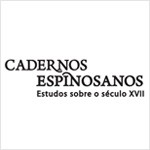THE METAPHYSICS OF AUGUSTINE AND THE FOUNDATION OF THE CARTESIAN SCIENCE
Cadernos Espinosanos n. 37 (2017) • Cadernos Espinosanos - Estudos sobre o século XVII
Autor: William de Jesus Teixeira
Resumo:
The aim of this paper is to show to what extent Descartes can be situated within the Augustinian metaphysical tradition and to what extent he has departed from it. To this end, we will argue that Descartes has borrowed his main Meditations’ arguments from Augustine’s philosophy. However, in spite of all factual and textual evidence we will provide against the originality of Descartes’ metaphysical discussions, it will be stressed, on the other hand, that in borrowing not only the cogito argument, but also some general features of his philosophy from Augustine’s works, Descartes intends to frame a metaphysics which will be the ground on his new mechanistic physics. Having this in mind, we will hold that no claim can be put forward against the originality and far-reaching scope of Descartes’ philosophical intentions. Indeed, Descartes’ purpose is to build a new science under a metaphysics, even though this metaphysics is the Augustianian one.
DOI: https://doi.org/10.11606/issn.2447-9012.espinosa.2017.137402
Texto Completo: http://www.revistas.usp.br/espinosanos/article/view/137402

Cadernos Espinosanos - Estudos sobre o século XVII
O objetivo dos Cadernos Espinosanos é publicar semestralmente trabalhos sobre filósofos seiscentistas, assim como leituras contemporâneas a respeito do pensamento destes, constituindo um canal de expressão dos estudantes e pesquisadores do Departamento de Filosofia da USP e de outras instituições brasileiras e estrangeiras.
Serão aceitos artigos e ensaios originais, traduções e resenhas que possam contribuir com o acervo sobre a filosofia moderna.
The aim of this journal is to published every semester works on seventeenth-century philosophers, as well as contemporary readings about the thought of these, constituting a channel of expression of students and researchers from the Department of Philosophy at USP and other Brazilian and foreign institutions.
Articles and original essays, translations and reviews that may contribute to the early modern philosophy research will be accepted.
